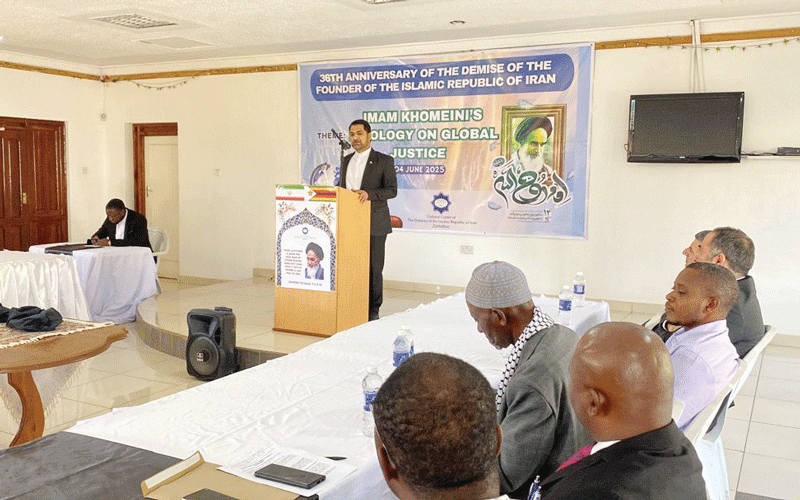
ZIMBABWEANS and Iranians resident in Zimbabwe have called for a justice-driven world order as a way of honouring modern Iran’s founding father, the late Imam Ruholla Khomeini’s legacy.
At a lecture series on Wednesday this week to mark 36 years since his death, they spoke glowingly of the legendary late statesman who fought gallantly for the emancipation and freedom of all the oppressed people of the world.
They paid tribute to his legacy that continues to redefine the new world order, that of justice for humanity.
Officially opening the conference, professor Fainos Mangena, the dean of the Faculty of Arts and Humanities at the University of Zimbabwe, said Khomeini fought and advocated for a world in which justice prevailed.
Mangena condemned Western powers for downplaying the injustice perpetrated on other countries by some nations.
He said it was “baffling that some Western countries still do not believe in the concept that there should be justice for the oppressed.”
Mangena said the successful execution of the Islamic Revolution was an awakening call for most of the oppressed people globally as it galvanised them to fight for their freedom.
Hamid Bakhtiyar, the cultural counsellor of the Embassy of Iran in Zimbabwe, said Khomeini was more than a political leader as he was also a voice for the voiceless.
- Woods fuels Masters’ return rumours
- WHAWHA, HARARE CITY SHARE SPOILS
- Author pens book in honour of Dendera
- WHAWHA, HARARE CITY SHARE SPOILS
Keep Reading
“Imam Khomeini was . . . a symbol of resistance against injustice in all its forms. His teachings were not limited to one country or religion; they resonated across continents — wherever people were suffering under oppression, foreign domination or cultural humiliation,” Bakhtiyar said.
“He particularly addressed those who have been subjected to centuries of colonialism, racial injustice and economic exploitation.”
Bakhtiyr said Khomeini fought global domination by some perceived powerful nations, as he called for global awakening, a rallying call that continued to embolden all world citizens still seeking freedom from oppressors.
Nasseri Assiabi, second secretary at the Embassy of Iran in Zimbabwe, said in line with Khomeini’s teachings, Iran continued to support the world’s oppressed.
“The legacy from Imam Khomeini that has remained as a prominent manifestation of our revolutionary movement . . . has led us to a completely different approach in a world that was dominated by capitalism, imperialism and socialism, among other ‘isms’,” he said.
“Now we are the pride of ourselves from the fact that Iran is the strongest supporter of the oppressed people of Palestine who are under the most hostile bombardments by the Zionist regime.
“This is what we have done in the last 46 years, namely supporting all the people who were oppressed in disregard to their beliefs and religions. We learnt from Imam Khomeini that no nation must be under the domination of other nations. All are free and have the right to self-determination.”
Bishop Albert Chikuni, president of the Interreligious Association for Peace and Development Zimbabwe, encouraged global faith-based organisation to engage in meaningful dialogue for the sustenance of an enduring justice system that can overcome divisions among nations and communities.
Azizi, a lecturer in the Department of Philosophy, Religion and Ethics at the University of Zimbabwe said the creation of an Islamic Republic by Khomeini was to simply demonstrate to the world that a religious nation could be sustained.
He said his creation of the Islamic Republic of Iran emboldened modernity and brought about broad social changes that made Iran a great and much recognised nation.
The conference was attended by academics from the University of Zimbabwe and Arrupe Jesuit University, the Zimbabwe Catholic Bishops Conference, leaders of Zimbabwe’s various religious organisations, diplomats from the Embassy of Iran, as well as members of the Iranian community resident in Zimbabwe.










